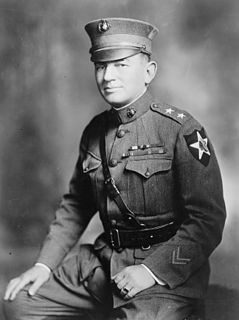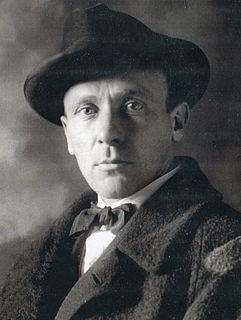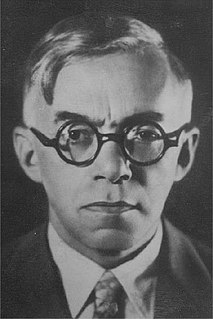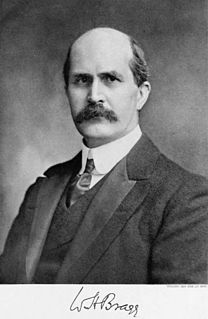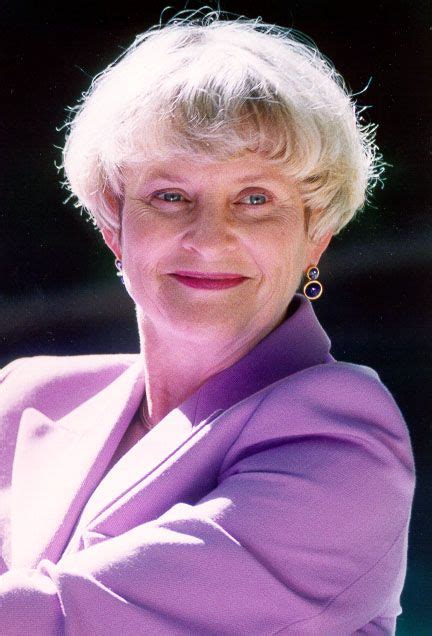Top 354 Insisted Quotes & Sayings - Page 6
Explore popular Insisted quotes.
Last updated on November 20, 2024.
Fr. Amphilochios, the geronta or elder on the island of Patmos when I first stayed there, would have been in full agreement. Do you know, he said, that God gave us one more commandment, which is not recorded in Scripture? It is the commandment love the trees. Whoever does not love trees, so he believed, does not love God. When you plant a tree, he insisted, you plant hope, you plant peace, you plant love, and you will receive God's blessing.
In Brazil, there is a fear and a denial of our past. Downtown Rio used to display the history of colonialism in Brazil. They had beautiful buildings and theaters, and there was a bakery that was threatened to be demolished, but people insisted against it. They laid down in front of it and said, "You're going to have to go over my body to destroy it." It frustrates me when I see people on Facebook posing in front of old buildings while on vacation, because they could've posed in front of equally beautiful buildings at home in Rio.
But we are gravely mistaken to think that Christianity protects us from the pain and agony of mortal existence. Christianity has always insisted that the cross we bear precedes the crown we wear. To be a Christian, one must take up his cross, with all of its difficulties and agonizing and tragedy-packed content, and carry it until that very cross leaves its marks upon us and redeems us to that more excellent way which comes only through suffering.
Philosophers often think all scientists must be scientific realists. If you ask a simple question like "Are electrons real?" the answer will be "Yes". But if your questions are less superficial, for example whether some well-known scientist was a good scientist. Then, they had insisted that only empirical criteria matter and that they actually did not believe in the reality of sub-atomic entities. Ask "If that turned out to be true, would you still say they were good scientists?" The answer would reveal something about how they themselves understood what it is to be a scientist.
Be kindly and just in your dealings with your men. Never play favorites. Make them feel that justice tempered with mercy may always be counted on. This does not mean a slackening of discipline. Obedience to orders and regulations must always be insisted upon, and good conduct on the part of the men exacted. Especially should this be done with reference to civilian inhabitants of foreign countries in which Marines are serving.
Why are you drinking? demanded the little prince. "So that I may forget," replied the tippler. "Forget what?" inquired the little prince, who was already sorry for him. "Forget that I am ashamed," the tippler confessed, hanging his head. "Ashamed of what?" insisted the little prince, who wanted to help him. "Ashamed of drinking!
I had long since insisted upon interpreting the things that Fate forced me to do as victories of my own will and intelligence, and now this bad habit had grown into a sort of frenzied arrogance. In the nature of what I was calling my intelligence there was a touch of something illegitimate, a touch of the sham pretender who has been placed on the throne by some freak chance. This dolt of a usurper could not foresee the revenge that would inevitably be wreaked upon his stupid despotism.
Does everyone grow the way you do?" puffed Milo when he had caught up. "Almost everyone," replied Alec, and then he stopped a moment and thought. "Now and then, though, someone does begin to grow differently. Instead of down, his feet grow up towards the sky. But we do our best to discourage awkward things like that." "What happens to them?" insisted Milo. "Oddly enough, they often grow ten times the size of everyone else," said Alec thoughtfully, "and I've heard that they walk among the stars." And with that he skipped off once again toward the waiting woods.
I would never date a girl who insisted that I cut you out of my life. It’s non-negotiable. You want a piece of all this fabulousness?” He gestured at himself. “Well, my best friend comes along with it. I wouldn’t cut you out of my life, Clary, any more than I would cut off my right hand and give it to someone as a Valentine’s Day gift.” “Gross,” said Clary. “Must you?” He grinned. “I must.
Daniel, I did not knowwhat I wanted when I was agirl. And then I was a fool in every sense of the word. And now that I am a woman grown, I know that I love you and I want this son of yours, and our children who will come. I have seen a woman break her heart for love: my Queen Mary. I have seen another break her soul to avoid it: my Princess Elizabeth. I don't want to be Mary or Elizabeth, I want to be me: Hannah Verde Carpenter." "And we shall live somewhere that we can follow our belifs without danger," he insisted. "Yes," I said, "in the England that Elizabeth will make.
Vanity, right?" Nash reappeared in the living room with an open bag of potato chips. "I nominate my venerable brother. He likes to play hero, and one look at him should establish the vanity angle." "Nash!" I really shouldn't have been surprised by the dig. But I was. "What?" He raised one brow at me in challenge. "It's okay to call me jealous, but not to call him vain?" "Awareness of one's obvious advantages doesn't imply vanity," Tod insisted calmly. Nash turned on him. "Does it imply narcissism?" Tod huffed. "This coming from the guy who owns more hair products than his girlfriend.
There were times when I asked myself whether I was being principled or simply a coward.... I was wrapped in the cocoon of tennis early in life, mainly by blacks like my most powerful mentor, Dr. Robert Walter Johnson of Lynchburg, Virginia. They insisted that I be unfailingly polite on the court, unfalteringly calm and detached, so that whites could never accuse me of meanness. I learned well. I look at photographs of the skinny, frail, little black boy that I was in the early 1950s, and I see that I was my tennis racquet and my tennis racquet was me. It was my rod and my staff.
Aspiring black leaders are often asked to transcend race, even though no one ever asked, say, Hillary Clinton to transcend gender. This is a precarious race straddle that most members of the breakthrough generation seem to reject. Even the most well meaning white Obama supporters seem to take deep satisfaction in this idea. Obama, they insisted, could be raceless, a reasurringly optimistic view of America's deepest burden that ignores countless peices of evidence to the contrary.
I did not set out to be beloved and just, only strong." 'A King can be better than that," the Prince insisted. "And so we all begin, determined to better our fathers' performances, knowing we can change the very nature of humanity, make it better, cleaner. But then daggers strike in the night, and peasants revolt, and all manner of atrocities become a necessity as breakfast. Only Princes believe in the greater good. Kings know there is only Reign, and all things may be committed in its holy name.
So this is reality, this forgiveness, this reconciliation, is true for everybody. Paul insisted that when Jesus died on the cross, he was reconciling "all things, in heaven and on earth, to God." All things, everywhere. ...This reality then isn't something we make come true about ourselves by doing something. It is already true. Our choice is to live in this new reality or cling to a reality of our own making.
The philosophers of industrialism, from Bacon to Bentham, from Smith to Marx, insisted that the improvement of man's condition was the highest requirement of morality. But in what did the improvement consist? The answer seemed so obvious to them that they did not bother to justify it: the expansion and fulfillment of the material wants of man, and the spread of these benefits, from the few who had once preempted them, to the many who had so long lived on the scraps Dives had thrown into the gutter.
India, she now knew, would not be content staying in the background, was nobody's wallpaper, insisted in interjecting itself into everyone's life, meddling with it, twisting it, molding it beyond recognition. India, she had found out, was a place of political intrigue and economic corruption, a place occupied by real people with their incessantly human needs, desires, ambitions, and aspirations, and not the exotic, spiritual, mysterious entity that was a creation of the Western imagination.
There’s a good kind of crazy, Kaylee,” he insisted softly, reaching out to wrap his warm hand around mine. “It’s the kind that makes you think about things that make your head hurt, because not thinking about them is the coward’s way out. The kind that makes you touch people who bruise your soul, just because they need to be touched. This is the kind of crazy that lets you stare out into the darkness and rage at eternity, while it stares back at you, ready to swallow you whole.
For as long as men and women have talked about war, they have talked about it in terms of right and wrong. And for almost as long, some among them have derided such talk, called it a charade, insisted that war lies beyond (or beneath) moral judgment. War is a world apart, where life itself is at stake, where human nature is reduced to its elemental forms, where self-interest and necessity prevail. Here men and women do what they must to save themselves and their communities, and morality and law have no place. Inter arma silent leges: in time of war the law is silent.
Nobody likes cravens,” he said uncomfortably. “I wish we hadn’t helped him. What if they think we’re craven too?” "You're too stupid to be craven,” Pyp told him. “I am not,” Grenn said. “Yes you are. If a bear attacked you in the woods, you’d be too stupid to run away.” “I would not,” Grenn insisted. “I’d run away faster than you.” He stopped suddenly, scowling when he saw Pyp’s grin and realized what he’d just said.
The Andrians were the first of the islanders to refuse Themistocles' demand for money. He had put it to them that they would be unable to avoid paying, because the Athenians had the support of two powerful deities, one called Persuasion and the other Compulsion.The Andrians had replied that Athens was lucky to have two such useful gods, who were obviously responsible for her wealth and greatness; unfortunately, they themselves, in their small & inadequate land, had two utterly useless deities, who refused to leave the island and insisted on staying; and their names were Poverty and Inability.
A damnably readable, streamlined, yet deeply researched work. Skipping the ancestors and aftermath of conventional biography, Max gives us the man, his work, and his times-the niceties of which (so complicated, so exquisitely intertwined) Max articulates with, well, Wallace-like lucidity and wit. Above all this is the story of a touching young man who insisted on being something better than simply the smartest person in the room.
Love leaped out in front of us like a murderer in an alley leaping out of nowhere, and struck us both at once. As lightning strikes, as a Finnish knife strikes! She, by the way, insisted afterwards that it wasn't so, that we had, of course, loved each other for a long, long time, without knowing each other, never having seen each other.
You're a rotten driver,' I protested. 'Either you ought to be more careful or you oughtn't to drive at all.' 'I am careful.' 'No, you're not.' 'Well, other people are,' she said lightly. 'What's that got to do with it?' 'They'll keep out of my way,' she insisted. 'It takes two to make an accident.' 'Suppose you met somebody just as careless as yourself.' 'I hope I never will,' she answered. 'I hate careless people. That's why I like you.' Her grey, sun-strained eyes stared straight ahead, but she had deliberately shifted our relations, and for a moment I thought I loved her.
We have to make sure that college is accessible and affordable. Two years ago, I stood here and called upon our institutions of higher learning to develop plans for degrees that cost no more than $10,000. There were plenty of detractors at that time who insisted it couldn't be done. However, that call inspired educators at colleges and universities across our state to step up to the plate. Today, I'm proud to tell you that thirteen Texas universities have announced plans for a $10,000 degree.
...Jabotinsky insisted that all energies be expended to force the Congress to join the boycott movement. Nothing less than a 'merciless fight' would be acceptable, cried Jabotinsky. 'The present Congress is duty bound to put the Jewish problem in Germany before the entire world...(We [Jews] must) destroy, destroy, destroy them, not only with the boycott, but politically, supporting all existing forces against them to isolate Germany from the civilized world...our enemy [Germany] must be destroyed.
During the Second War, the U.S.O. sent special issues of the principal American magazines to the Armed Forces, with the ads omitted. The men insisted on having the ads back again. Naturally. The ads are by far the best part of any magazine or newspaper. More pains and thought, more wit and art go into the making of an ad than into any prose feature of press or magazine. Ads are news. What is wrong with them is that they are always good news.
Sonnet XXV Before I loved you, love, nothing was my own: I wavered through the streets, among Objects: Nothing mattered or had a name: The world was made of air, which waited. I knew rooms full of ashes, Tunnels where the moon lived, Rough warehouses that growled 'get lost', Questions that insisted in the sand. Everything was empty, dead, mute, Fallen abandoned, and decayed: Inconceivably alien, it all Belonged to someone else - to no one: Till your beauty and your poverty Filled the autumn plentiful with gifts.
I'm here," she said, skidding to a stop. "Can we go now?" Sebastian insisted on helping her on with the coat. "I don't think anyone's ever helped me with my coat before," Clary observed, freeing the hair that had gotten trapped under her collar. "Well, maybe waiters. Were you ever a waiter?" "No, but I was brought up by a Frenchwoman," Sebastian reminded her. "It involves an even more rigorous course of training.
A few ideas seem to be agreed upon. Help none but those who help themselves. Educate only at schools which provide in some form for industrial education. These two points should be insisted upon. Let the normal instruction be that men must earn their own living, and that by the labor of their hands as far as may be. This is the gospel of salvation for the colored man. Let the labor not be servile, but in manly occupations like that of the carpenter, the farmer, and the blacksmith.
An important United Nations environmental conference went past 6:00 in the evening when the interpreters' contracted working conditions said they could leave. They left, abandoning the delegates unable to talk to each other in their native languages. The French head of the committee, who had insisted on speaking only in French throughout the week suddenly demonstrated the ability to speak excellent English with English-speaking delegates.
The longer I lived, the more beautiful life became - despite my personal tragedies, the fire, despite my third wife and her dreadful taste. My dear Olgivanna, she insisted on replacing the lovely canvas and wooden trusses at Taliesin West with steel supports and pink frosted glass. Well, I was too old to care by then. What I decided early on was this: If you foolishly ignore beauty, you will soon find yourself without it. Your life will be impoverished. But if you invest in beauty, it will remain with you all the days of your life.
He Sipped his coffee, watched the flames. "You gave me my life, you did," He insisted when Summerset made a protesting sound. "And I worked-in my fashion- to build this place. I asked you to tend it for me. You've never let me down. But I needed her. The one thing, the only thing that could make this place home." "She's not what I would have chosen for you" "Oh, that I know" "But she's right for you. The one for you." Despite, or maybe due to, her many flaws" "I imagine she thinks the same thing about you". Memory in Death, Roarke and Summerset
Eisenhower had run the Army; he knew all the ways decision making can go off the rails, and insisted on collective debate precisely to prevent senior officials from freelancing, or putting their departmental interests first. For all the formal machinery, Eisenhower was very literally the commander in chief, making the key decisions himself and monitoring closely how they were carried out. Even years after D-Day, when critics needled him for not being on the front lines with the invading forces, he retorted, “I planned it and took responsibility for it. Did you want me to unload a truck?
There's some that came here never believing they were dead. They insisted all the way that they were alive, it was a mistake, someone would have to pay; made no difference. There's others who longed to be dead when they were alive, poor souls; lives full of pain or misery; killed themselves for a chance of a blessed rest, and found that nothing had changed except for the worse, and this time there was no escape; you can't make yourself alive again.
In one question you are expressing a world of opinion. Because it is you who thinks that America has been mistakenly starting these conflicts. I happen to agree with you, and I will repeat what your question suggested...we have mistakenly gotten into one fracas after another. Why we do that [United States has insisted on keeping up a string of enemies, and the wars associated with creating those enemies], I think it's because we're afraid to look in the mirror and understand who we are.
Science is experimental, moving forward step-by-step, making trial and learning through success and failure. Is not this also the way of religion, and especially of the Christian religion? The writings of those who preach the religion have from the very beginning insisted that it is to be proved by experience. If a man is drawn towards honour and courage and endurance, justice, mercy, and charity, let him follow the way of Christ and find out for himself. No findings in science hinder him in that way.
Please do not leave me, he thought. He could not bear a world without Alli. He realized how much he relied on her from morning until night. She was his only conversation. His only smile. She prepared their meager food and always offered it to him first, even though he insisted she eat before he did. THey leaned on each other at sunsets. Holding her as they slept felt like his last connection to humanity.
I know also another man who married a widow with several children; and when one of the girls had grown into her teens he insisted on marrying her also, having first by some means won her affections. The mother, however, was much opposed to this marriage, and finally gave up her husband entirely to her daughter; and to this very day the daughter bears children to her stepfather, living as wife in the same house with her mother!
When my daughter went to school, her last name was mine. The school insisted that her father's name be added to hers, not her mother's. The fact that the mother kept her in her womb for nine months is forgotten. Women don't have an identity. She has her father's name today and will have her husband's tomorrow.
We're not obsessed by anything, you see," insisted Ford. "..." "And that's the deciding factor. We can't win against obsession. They care, we don't. They win." "I care about lots of things," said Slartibartfast, his voice trembling partly with annoyance, but partly also with uncertainty. "Such as?" "Well," said the old man, "life, the Universe. Everything, really. Fjords." "Would you die for them?" "Fjords?" blinked Slartibartfast in surprise. "No." "Well then." "Wouldn't see the point, to be honest.
We were great mates [with Rajiv Gandhi]: very, very, very close friends. In fact, on my visit to India as Prime Minister, we were going to his home for dinner. There were two aspects I remember: one is him saying how he had trouble with his security people, because they insisted he wears a vest. He said it was very uncomfortable and he often took it off, but of course, in the end, it wouldn't have mattered if he'd been wearing three vests - he would have been gone.
Well into the 19th century there were pronouncements from just about every branch of science and medicine that reading, writing, and thinking were dangerous for women. Articles in the Lancet declared that women's brains would burst and their uteruses atrophy if they engaged in any form of rigorous thinking. The famous physician J.D. Kellogg insisted that novel reading was the greatest cause of uterine disease among young women and urged parents to protect their daughters from the dreaded consequences of print.
It seems to me that it was well said by Madama Serenissima, and insisted on by your reverence, that the Holy Scripture cannot err, and that the decrees therein contained are absolutely true and inviolable. But I should have in your place added that, though Scripture cannot err, its expounders and interpreters are liable to err in many ways; and one error in particular would be most grave and most frequent, if we always stopped short at the literal signification of the words.
My neighbor Alice Pierce is fond of singing folk music to her garden plants. Thinks it makes them grow or something. The Major had often wondered how a wailing rendition of 'Greensleeves' would encourage greater raspberry production but Alice insisted that it worked far better than chemical fertilizers, and she did produce several kinds of fruit in pie-worthy quantitites. No sense of pitch, but plenty of enthusiasm, he added.
But yeah, Ann [Trason] insisted, running was romantic; and no, of course her friends didn't get it because they'd never broken through. For them, running was a miserable two miles motivated solely by size 6 jeans: get on the scale, get depressed, get your headphones on, and get it over with. But you can't muscle through a five-hour run that way; you have to relax into it, like easing your body into a hot bath, until it no longer resists the shock and begins to enjoy it.
Even if a civil society were to be dissolved by the consent of all its members (e.g., if a people inhabiting an island decided to separate and disperse throughout the world), the last murderer remaining in prison would first have to be executed, so that each has done to him what his deeds deserve and blood guilt does not cling to the people for not having insisted upon this punishment; for otherwise the people can be regarded as collaborators in his public violation of justice.
Well, one time some attractive woman sat next to Charlie and asked him what he owed his success to, and, unfortunately, she insisted on a one word answer. He had a speech prepared that would have gone on for several hours. But when forced to boil it down to one word, he said that was "rational". You know, he comes equipped for rationality, and he applies it in business. He doesn't always apply it elsewhere, but he applies it in business and that has made him a huge business success.
Fact is, the work place to a great extent is "where we live." We need star accountants. Boffo saleswomen. Over-the-top creatives in marketing and new product development. And so on. But, since we're effectively talking about "where we live," good sense and good business and "good" engagement throughout the "supply chain," from vendor's vendor to customer's customer, we would benefit mightily-including on the P & L-if we insisted (!) on: "Pleasant." "Caring." "Engaged."
Modern Romans insisted that there was only one god, a notion that struck Alobar as comically simplistic. Worse, this Semitic deity was reputed to be jealous (what was there to be jealous of if there were no other gods?), vindictive, and altogether foul-tempered. If you didn't serve the nasty fellow, the Romans would burn your house down. If you did serve him, you were called a Christian and got to burn other people's houses down.
Most artists, or at least most of the ones I know, deny having a philosophical outlook that they try to translate into their works. Some had thought of the work of Cezanne and others as being a 'painted epistemology.' But Cezanne himself denied this and Daniel-Henri Kahnwiler, the art critic and art dealer, insisted that none of the many painters he had known had a philosophical culture.
My Mom played violin and piano when she was growing up and she insisted, and I don't know if you can imagine how uncool it is to play the violin when you're eight and ten years old, but I told my Mom that I would quit every day until I went to high school and I met these other gentlemen who would become Yellowcard, and my friends, and I really fell in love with music and it wasn't just classical music, just submerged in the arts in the school I was in.
What do you see when you see me?' She asked him, burying her own face in his bosom. 'Do you want the truth?' She nodded. 'The firing squad.' 'That's not the whole truth. Try again.' 'Insatiability,' he said with some bitterness. 'That's oblique but altogether too simple. Once more,' she insisted. 'One more time.' He was silent for several minutes. 'The map of a country in which I only exist by virtue of the extravagance of my metaphors.' 'Now you're being too sophisticated. And, besides, what metaphors do we have in common?




